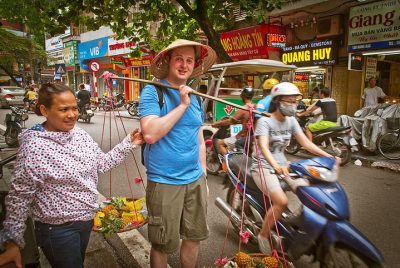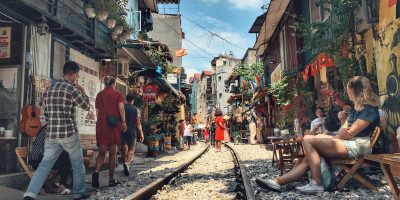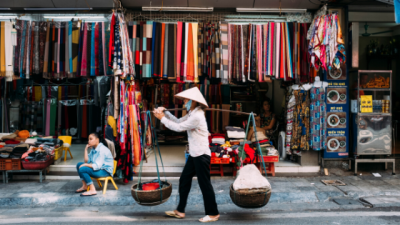With its vibrant culture, stunning landscapes, and friendly people, Vietnam has become an increasingly popular destination for expats. If you're considering moving to Vietnam, here's a guide to help you navigate the process:

What is interesting about living in Vietnam as an expat?
Living in Vietnam as an expat offers an exciting blend of rich cultural experiences and a rapidly developing infrastructure. Here are some key highlights that make Vietnam an appealing destination for expats:
Climate in Vietnam
Vietnam’s climate is diverse, making it possible to experience different weather patterns depending on where you live. The country is divided into three main regions:
- Northern Vietnam has four seasons. A cool winter lasts from November to February. The summer is hot and humid, lasting from May to August. Hanoi, for instance, has a mild winter, perfect for those who prefer seasonal changes.
- Central Vietnam has coastal cities called Da Nang and Hoi An. They have a tropical monsoon climate. This means they get rain from September to December. This region tends to be warm year-round but is less extreme than the south.
- Southern Vietnam has a tropical climate. Only two seasons exist: wet and dry. This is true for Ho Chi Minh City and the southern areas. The dry season runs from November to April, while the wet season (characterized by heavy but short-lived rain) occurs from May to October.
The different climates allow expats to pick the region they like best. They can choose from cool mountain areas or warm, sunny beaches.
Culture
Vietnam boasts a rich and diverse culture that fascinates many expats. Deeply rooted in Confucian traditions, the culture emphasizes respect for elders, family values, and community living. However, it’s also a country undergoing rapid modernization, blending ancient traditions with a youthful, energetic vibe.
- Festivals and Celebrations: Vietnam's biggest holiday is Tet Holiday, also known as Lunar New Year. A time for family gatherings, traditional foods, and fireworks has arrived. Other festivals, such as the Mid-Autumn Festival and Hue Festival, showcase the vibrant heritage of the country.
- Food: Vietnamese cuisine is a major highlight for expats. People around the world love dishes like pho, banh mi, and goi cuon (spring rolls). For expats, trying local street food is an exciting daily adventure. They enjoy fresh herbs and the unique balance of flavors in Vietnamese cooking.
- Art and History: Expats can explore Vietnam’s rich history by visiting temples, museums, and historical sites. Key places include the Cu Chi Tunnels, the Imperial City of Hue, and the Old Quarter of Hanoi. Vietnamese art, including traditional lacquer painting and water puppetry, is also worth exploring.
Transportation
Traveling in Vietnam is easy and cheap. However, it can be a challenge for newcomers. The streets are busy with heavy traffic and many motorbikes. Here are some options for transportation:
- Motorbikes: Motorbikes are the primary mode of transportation in Vietnam. Many expats quickly adapt to riding one, and renting or buying a motorbike is cheap and efficient. However, navigating traffic, especially in major cities like Ho Chi Minh and Hanoi, can be daunting at first.
- Public Buses: Vietnam has an extensive public bus network that is cheap and covers most major cities. While not always the most comfortable, buses are a reliable option for those who don’t want to drive.
- Ride-hailing apps are popular in Vietnam. Grab is similar to Uber. These apps provide car and motorbike taxi services. These are convenient, safe, and affordable for daily commuting.
- Cycling is a popular way to get around in cities like Da Nang and Hoi An. The scenery is scenic and enjoyable. Many people like to cycle because it is slower. This allows them to explore the area better.
- Vietnam has a reliable train system. It runs from north to south. This train service offers an affordable way to travel long distances between cities. Domestic flights are also frequent and reasonably priced, making it easy to explore different regions of the country.
Applying for Visa for Expats and Foreigners in Vietnam

Living in Vietnam as an expat means you need to apply for Vietnam visa. This depends on how long you stay and why you are there. Several visa options are available depending on the type of work or business foreigners intend to pursue. The LD visa is the most common work visa, designed specifically for foreign employees working for organizations in Vietnam.
Talking to the Vietnamese embassy or consulate in your home country is best. They can help you understand the visa requirements and procedures. Appropriate preparation and understanding of the visa procedure are essential for a seamless adaptation to living in Vietnam.
To live in Vietnam long-term as an expat, there are three main steps in the application process:
- Work Permit: A work permit, typically valid for two years, must be secured at least two weeks before your employment start date in Vietnam.
- Temporary Residence Card: This visa lets expats enter and stay in Vietnam. Valid for 2 to 5 years. The length depends on each person's situation. The specific requirements and duration will vary.
- Permanent Residence Card: After living in Vietnam for 3 years, foreigners can apply for permanent residency. They must also show a stable income. You must renew this card every 10 years.
To make the process easier, it's best to work with a local law firm. They can help you understand the application requirements and follow the procedures.
What is the cost of living in Vietnam for Expats?

One of the biggest draws for expats moving to Vietnam is the low cost of living. Compared to Western countries or neighboring Southeast Asian countries, Vietnam offers an affordable lifestyle without compromising on quality.
Monthly expenses for a single person range between $800 and $1,500, depending on the city and lifestyle. In densely populated cities like Ho Chi Minh City and Hanoi, living costs are higher. However, you can still live comfortably on a small budget.
What language do they speak in Vietnam?
Vietnamese is the official language. People often speak English in large metropolitan areas and popular tourist destinations.
However, learning some basic Vietnamese phrases is useful. This is especially true if you plan to live in smaller towns. Understanding the language will help you integrate into the community, build stronger relationships, and enhance your cultural experience.
Best Places to Live in Vietnam and How to find accommodation

Where should expats live in Vietnam?
Choosing where to live in Vietnam depends on your lifestyle and preferences. Here’s a quick guide:
- Ho Chi Minh City: For those who love a bustling, modern city with a vibrant expat community.
- Hanoi: Perfect for history lovers and those who enjoy a slower pace with rich cultural surroundings.
- Da Nang: Ideal for a beach-city mix and access to nature.
- Hoi An: Best for expats seeking a quieter, artsy town with traditional charm.
- Nha Trang: A good fit for those who prioritize beach life with easy access to city comforts.
How much does it cost to rent in Vietnam?
Renting in Vietnam's major urban centers like Ho Chi Minh City and Hanoi can cost around $400 to $700 per month. If you prefer to live outside the city center, rent can drop to as low as $250. Smaller cities like Da Nang and Hoi An are cheaper and more appealing for expats seeking a quieter lifestyle.
Most expats find apartments through online platforms, real estate agents, or expat groups on social media. Websites like Batdongsan.com and Craigslist Vietnam are also useful for browsing listings.
Job opportunities for Expats living in Vietnam

Vietnam's fast-growing economy has created a demand for skilled foreign workers. Some highly recommended sectors for expats include:
- Teaching English: English teachers are in high demand, especially in private schools and language centers. Many employers often require TEFL certification.
- Technology: The tech sector is booming, with opportunities in software development, IT services, and startups.
- Friendliness and Tourism: With tourism on the rise, there are numerous opportunities for hotels, restaurants, and tour companies.
- Business and Marketing: Global companies often seek expats for specialized positions in finance, marketing, and business development.
Networking is key to finding job opportunities in Vietnam. Many expats use LinkedIn, join local networking events, or connect through expat forums to discover job openings. Before that, you have to apply for a work permit in Vietnam.
Emigrating to Vietnam as an expat is special. You can enjoy both traditional culture and modern comforts. This mix makes it an exciting place to live.
Vietnam has a warm climate. The food is delicious. Transportation is affordable. The people are friendly. These factors make it a great place to explore and discover.




